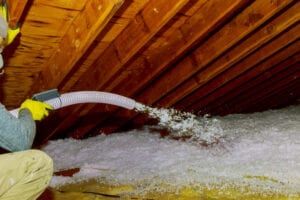Why Do I Need Roofing Insulation?
Insulation is a crucial component of any effective roofing system. For both comfort and energy conservation, all homeowners can benefit from installing roofing insulation.

Roofing Insulation for Energy-Efficiency
While energy-efficient roofing materials are helpful, insulation is the best way to conserve energy in your home’s roofing. This is because insulation protects the temperature of your living spaces, no matter the weather outside. If the sun is beating down on your roof, insulation will help keep cool air in your home. If there’s a blizzard outside, insulation will keep the cold air out of your home and reduce strain on your home’s heating system.
Roofing and attic insulation allows your home’s heating and cooling systems to operate more efficiently. By using less energy to power these systems, you’ll notice significant energy savings from roofing insulation.
Extend the Lifespan of Your Roof
Insulating your roof and attic will prevent damage over time. The temperature regulation and circulation that insulation provides prevents moisture from accumulating in your roofing materials. This lowers your risk for water damage, rotting, and deterioration, all of which would require major roofing repairs.
Roofing insulation also prevents ice damming, which occurs when ice forms along the edges of a roof. Ice damming can lead to water accumulation on your roof and may even cause leakage.
What Types of Roof Insulation Are Available?
Several different types of roof insulation are available to homeowners, including:
Fiberglass insulation
Fiberglass insulation comes in both blanket and loose-fill form. It’s an inexpensive roofing insulation option that ranges in thickness. The thicker the fiberglass insulation, the more efficient it is at reducing heat transfer. The R-value, which is used to measure insulation efficiency, typically ranges from 3 to 4 for fiberglass insulation.
Spray foam
Spray-on polyurethane foam is also available for roofing insulation. On average, spray foam has an R-value of 5.9, which is high compared to other insulation materials. However, it can be pricey, and the installation process is often messy.
Rigid boards
Rigid boards can be installed in the roof rafters for installation. The boards can be made from many different types of materials, including wood, foam, cork, and straw. Foam board insulation can vary in R-value from 3.8 to 8.
The process of installing roofing insulation is uncomplicated, and it can be added to your roof at any time. Contact your local roofing contractors to learn more about roofing insulation today.
